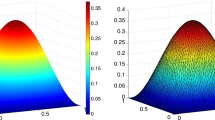Summary.
This work presents an a posteriori error analysis for the finite element approximation of time-dependent Ginzburg-Landau type equations in two and three space dimensions. The solution of an elliptic, self-adjoint eigenvalue problem as a post-processing procedure in each time step of a finite element simulation leads to a fully computable upper bound for the error. Theoretical results for the stability of degree one vortices in Ginzburg-Landau equations and of generic interfaces in Allen-Cahn equations indicate that the error estimate only depends on the inverse of a small parameter in a low order polynomial. The actual dependence of the error estimate upon this parameter is explicitly determined by the computed eigenvalues and can therefore be monitored within an approximation scheme. The error bound allows for the introduction of local refinement indicators which may be used for adaptive mesh and time step size refinement and coarsening. Numerical experiments underline the reliability of this approach.
Similar content being viewed by others

References
Allen, S., Cahn, J.W.: A microscopic theory for antiphase boundary motion and its application to antiphase domain coarsening. Acta. Metall. 27, 1084–1095 (1979)
Babuška, I., Osborn, J.: Eigenvalue problems. In: Handbook of numerical analysis II, North-Holland, 1991, pp. 641–787
Bartels, S., Carstensen, C., Dolzmann, G.: Inhomogeneous Dirichlet conditions in a priori and a posteriori finite element error analysis. Numer. Math. 99, 1–24 (2004)
Beaulieu, A.: Some remarks on the linearized operator about the radial solution for the Ginzburg-Landau equation. Nonlinear Anal. 54, 1079–1119 (2003)
Carstensen, C.: Quasi interpolation and a posteriori error analysis in finite element method. Math. Modelling Numer. Anal. 33, 1187–1202 (1999)
Chen, X.: Spectrum for the Allen-Cahn, Cahn-Hilliard, and phase-field equations for generic interfaces. Commun. Partial Differential Equations 19, 1371–1395 (1994)
Clément, P.: Approximation by finite element functions using local regularization. RAIRO Sér. Rouge Anal. Numér. R–2, 77–84 (1975)
de Mottoni, P., Schatzman, M.: Geometrical evolution of developed interfaces. Trans. Amer. Math. Soc. 347, 1533–1589 (1995)
Du, Q., Gunzburger, M., Peterson, J.: Analysis and approximation of the Ginzburg-Landau model of superconductivity. SIAM Rev. 34, 54–81 (1992)
Elliott, C.M.: Approximation of curvature dependent interface motion. The state of the art in numerical analysis, Inst. Math. Appl. Conf. Ser. New Ser. 63, Oxford Univ. Press, 1997, pp. 407–440
Feng, X., Prohl, A.: Numerical analysis of the Allen-Cahn equation and approximation for mean curvature flows. Numer. Math. 94, 33–65 (2003)
Feng, X., Prohl, A.: Error analysis of a mixed finite element method for the Cahn–Hilliard equation. Numer. Math. 99, 47–84 (2004)
Feng, X., Prohl, A.: Analysis of a fully discrete finite element method for the phase field model and approximation of its sharp interface limits. Math. Comp. 73, 541–567 (2004)
Gilbarg, D., Trudinger, N.S.: Elliptic partial differential equations of second order. Springer, Berlin, 2001
Ginzburg, V., Landau, L.: On the theory of superconductivity. Zh. Èksper. Teoret. Fiz. 20, 1064–1082, (1950); In: L.D. Landau, D. ter Haar, (ed.), Men of Physics: Pergamon, Oxford, 1965, pp. 138–167
Kessler, D., Nochetto, R.H., Schmidt, A.: A posteriori error control for the Allen-Cahn problem: circumventing Gronwall’s inequality. M2AN Math. Model. Numer. Anal. 38, 129–142 (2004)
Larson, M.G.: A posteriori and a priori error analysis for finite element approximations of self-adjoint elliptic eigenvalue problems. SIAM J. Numer. Anal. 38, 608–625 (2000)
Lieb, E.H., Loss, M.: Symmetry of the Ginzburg-Landau minimizer in a disc. Math. Res. Lett. 1, 701–715 (1994)
Nochetto, R.H., Schmidt, A., Verdi, C.: A posteriori error estimation and adaptivity for degenerate parabolic problems. Math. Comp. 69, 1–24 (1999)
Verfürth, R.: A review of a posteriori error estimation and adaptive mesh-refinement techniques. Teubner Skripten zur Numerik, Teubner, Stuttgart, 1996
Author information
Authors and Affiliations
Corresponding author
Additional information
Mathematics Subject Classification(2000): 65M15, 65M60, 65M50.
AcknowledgmentS.B. is thankful to G. Dolzmann and R.H. Nochetto for stimulating discussions. This work was supported by a fellowship within the Postdoc-Programme of the German Academic Exchange Service (DAAD).
Rights and permissions
About this article
Cite this article
Bartels, S. A posteriori error analysis for time-dependent Ginzburg-Landau type equations. Numer. Math. 99, 557–583 (2005). https://doi.org/10.1007/s00211-004-0560-7
Revised:
Published:
Issue Date:
DOI: https://doi.org/10.1007/s00211-004-0560-7



